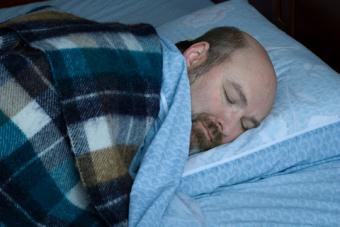
Sleep offset insomnia is a sleep disorder that can be difficult to detect. The symptoms of the condition are not typical of normal conceptions of insomnia.
Types of Insomnia
Many people may associate insomnia with the inability to fall asleep but the sleep disorder is much more complicated than that. Different types of insomnia exist:
- Sleep onset insomnia is a sleep problem that involves the inability to fall asleep within a reasonable amount of time. According to the National Sleep Foundation, the onset of sleep is a state that begins in the second stage of sleep. During this time, your body temperature decreases, heart rate and breathing become regular and you become disconnected from your surroundings. If it takes longer than 30 minutes to fall asleep, you may have insomnia that affects the onset of sleep.
- Sleep maintenance insomnia involves being unable to fall asleep after waking in the middle of the night.You may experience the sleep disruptions repeatedly throughout the night.
- Sleep offset insomnia, commonly known as late or terminal insomnia, occurs when you wake up very early in the morning and are unable to fall back to sleep. You may fall asleep easily but awaken after four or five hours of rest, and are unable to fall back asleep. In some cases, you may fall asleep right before your alarm rings.
Sleep Offset Insomnia
This type of insomnia is a pattern of restlessness that can be confusing because it involves waking at the end of the night. In some cases, a person may wake up at four or five in the morning, which may make the sleeper attribute the symptom as being an "early riser." However, when the sleeplessness leads to daytime sleepiness, the inability to concentrate and irritability, it is time to consider whether the early waking is a sleep disorder rather than a trait.
This sleep disorder may also be called:
- Terminal insomnia
- Late insomnia
- End of night waking
- Eary morning waking
Exploring the causes of the early morning waking can lead to treatments that work.
Causes
What causes a person to wake up too early? Sleeplessness and disruptions in sleeping patterns can be a sign of a medical condition. The sleep disturbances may be associated with anxiety and depression as well. It is most important to alert your physician about any sleep problems which you have on a consistent basis. Getting proper treatment for underlying conditions may naturally make the disturbances cease.
Conditions associated with late insomnia:
- Chronic pain can disrupt sleeping patterns and, since the sleep is lighter during the second half of the night, discomfort can cause you to wake up too early.
- Digestive problems can make it necessary for the body to use more energy to process food while you are asleep. This increased energy can lead to early waking.
- Depression may cause early morning waking. According to the Psychology Today article, "Bedfellows: Insomnia and Depression", early waking is a hallmark sign of depressive disorder.
- Prescription medication can disrupt sleeping patterns and alcohol is a depressant that can have stimulating effects hours after the person falls asleep.
Early termination of sleep may be a sign of advanced sleep phase syndrome. A person with advanced sleep phase syndrome tends to fall asleep before normal bedtimes and wakes up hours before normal. For example, you may fall asleep at 7pm and wake up at 3am. This condition is not a form of insomnia because the duration and quality of sleep are not disturbed.
Treatments
Treatment depends on the causes of the sleep disturbances. Techniques used to address sleep offset insomnia include:
- Relaxation exercises prior to falling asleep
- Improved sleep hygiene
- Changes in sleep environment
Lighter sleep occurs during the second half of the night as sleep cycles progress and some sleepers may be more sensitive to outside stimulation during the early morning hours. Sounds, lights and movements that would go undetected during deep sleep might awaken a person during lighter sleep cycles. Creating an environment that is condusive to sleep may help.
How Much Sleep Do You Need?
Keeping a sleep diary is an excellent approach to determining conditions which may cause you to wake up and it can help pinpoint a specific problem that disrupts sleep. Not everyone requires eight hours of sleep each night. Early termination of sleep may be a sign that you require fewer hours of sleep than others. It is important to explore this possibility with your physician if you experience early waking without other symptoms of insomnia or sleep deprivation.







